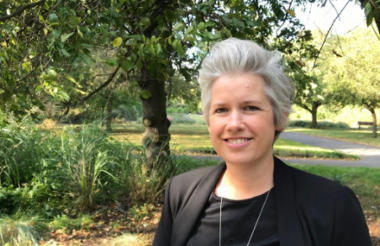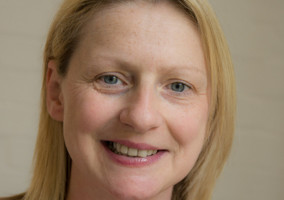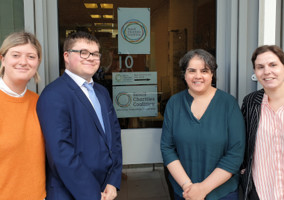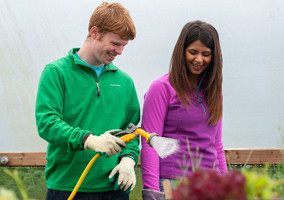Ruth Marvel had only been chief executive at Duke of Edinburgh’s Award (DofE) for a few months before the coronavirus hit.
Like many charities, DofE faces significant income losses, parts of its strategy are on hold, and it is looking at new ways to deliver for young people.
For Marvel, the crisis shows that the problems faced by her charity and others are exacerbated by a lack of understanding about how involved the sector is in delivering essential public services.
‘Simplistic characterisations of what we are’
Following the recent comments by Rishi Sunak, chancellor of the exchequer, where he spoke of the “gentleness” of the sector, Marvel suggests this perception of charity can be limiting.
“I think it is a complicated picture and one where charities aren't particularly well served by some quite simplistic characterisations of what we are and what we do,” she explains.
“There is this expectation that charities do things in a way that is kind, as opposed to business-like. And so when you are trying to run a charitable organisation to be both kind, generous, incredibly impactful and efficient, and not spend much money, it is a really difficult set of things to achieve and I would argue probably unrealistic.”
Marvel says that if food banks, hospices, advice services or youth programmes suddenly disappeared overnight, “there would be a shock to the system in terms of what that actually means – but it is quite hard to see that picture”.
“My sense is that the government does not really appreciate how much the charity sector provides … we are seen as a bit of an afterthought,” she says.
'Unrealistic expectations'
Marvel argues that the pandemic has brought to the fore some issues that the charity sector has been grappling with for some time.
She acknowledges that “scrutiny is a good thing in any context”, and that as charitable organisations are in receipt of both public and private money, “it is absolutely right that they should be open to scrutiny and be transparent”.
But she says charities face “very high expectations, perhaps unreasonable expectations”.
For Marvel, some of this expectation surrounds frugality: “There is an assumption that everything should be done cheaply.”
She says a significant proportion of charities are running frontline services, supporting vulnerable people or supporting infrastructure that acts as a safety net for people who are not being served by statutory services.
“I think there is a fundamental lack of understanding of how charities are embedded in the welfare state. Increasingly charities are involved in delivering statutory services, but they also run things like foodbanks, which are examples of where they are delivering services which sit in the cracks,” she says.
DofE's mission
Marvel joined the charity as chief executive last year in November, having previously been acting chief executive at Girlguiding.
“I have always had a lot of respect for DofE and it has quite a special place in the youth sector,” she says.
“The programme has not only a fantastic legacy, but it was designed with personalisation and flexibility built into it,” she explains.
Marvel says she likes working for charities because they are mission-focused: “I want to work for an organisation that is going to make a difference to people and where I can see how that difference is tangible.”
She adds: “If I do not have a purpose, I am not very motivated. I cannot think of a charitable organisation that does not have quite a clear concept of what it was set up to achieve, so that has always attracted me.”
Strategy ‘on pause’
Given the Covid-19 crisis, Marvel has had to hold back on some of her strategy.
“At the moment I am seeing the strategy as being on pause while we deal with the current scenario,” she says. “But certainly the ambition that we have set out and plans for this year are still there, they are just going to take a little longer.”
Marvel explains that the charity is “focusing on how young people can continue to work towards their award now we are in lockdown”.
“We are really conscious that a lot of the young people doing their DofE at the moment have had quite a lot of the other bits of structure and focus removed at really short notice,” she says.
But “the real advantage of DofE is that it is really flexible, so young people are choosing their own activities”.
During the lockdown young people are have been dancing, volunteering with St John Ambulance, creating PPE and learning British Sign Language to complete their award.
“What we don’t want to do is undermine the integrity of the award. It is valuable because it is a process and journey you go on, so removing bits of it would undermine essentially the experience that we want young people to get.”
‘We are facing a considerable knock to our income this year’
DofE has furloughed some staff and is “doing quite a lot of contingency planning”, as it is predicting a loss of around £5m in income due to Covid-19.
“We are being very prudent at the moment and trying to manage our income and reduce our expenditure as far as we can in order to be able to be positioned as well as possible for what comes next. We are facing a considerable knock to our income this year,” Marvel explains.
The charity expects to lose a combination of funds, including earned income from licence fees and young people participating, and fundraised income.
“While we have school and youth organisations not operating there are risks to our income which we are doing our best to manage,” she says.
Breaking down barriers
One of Marvel's main priorities is to “make sure that this experience is accessible for as many young people as possible”.
There are 461,563 young people currently doing their DofE programme, which Marvel says is a “great achievement”, but she adds: “I think DofE’s mission should be to make sure that as many young people as want to participate can do that, and can do that in a way that is affordable and accessible.
“I think we have done incredibly well as an organisation to be able to reach the number of young people we do, but there are still many young people who are not getting the opportunity.”
“Young people who are facing additional barriers to participation or disadvantage are less likely to be able to participate, so that is a real priority.”
Her aspirations include doing more to reach those with special education needs or other additional needs who may require extra support to take part.
At the moment the charity works with a number of special schools, but Marvel wants to make sure that it is supporting those organisations to be able to deliver the programme.
She also wants to continue to include those from lower-income families.
“This [the programme] is not necessarily something that they can prioritise,” Marvel says.
Putting young people at the heart of the charity
From her experience at Girlguiding, Marvel understands the value of having young people involved in the decision-making process, and wants to do more at DofE to make sure they are “contributing their thoughts and helping us to make decisions”.
She says: “At all levels in the organisation it is really important that your trustee board reflects your organisation, so I am very keen to see us engage some younger trustees.
“We also have a number of programmes across the organisation where ambassadors, who are young people, can represent the organisation, and I would like to build on those so that we have the voices of young people represented in each of our regions,” she explains.
Looking to the future
Marvel had only a few months in the role before the coronavirus pandemic. It was “not the first year I had envisaged,” she jests.
But she adds: “For all of the disruption and anxiety and fear that this has created, I think the experience of it has not perhaps been as bad as I thought.”
“It has galvanized people,” she says, adding: “We may well have ground that we need to make up as a consequence of this, but my hope is that we emerge as strong and as well-positioned as we can to be able to resume business as usual.”
She adds there is a really positive lesson to be learnt “that actually when we all pull together and we have a clear set of priorities, we can do it”.
“So I would like us to be able to resume business as usual as soon as possible, but recognise that our business as usual might be changed forever in a really good way, because we can do things differently and better in some cases,” she says.
More broadly she hopes that “the role the charity sector plays and the value that it creates will be better recognised and better understood”, and that after Covid-19 we “live in a world where charities are not living hand to mouth”.
Related articles
Helen Walker: ‘We need to be future-proofing Carers UK so that it continues to be fit for purpose’
After a year at the helm of Carers UK, Helen Walker tells Kirsty Weakley why its important for new CEOs to take the time to get a feel for the organisation they have joined and what plans she has for the future.
Rita Chadha: 'Why the Small Charities Coalition is redefining its remit'
The Small Charities Coalition's new chief executive, Rita Chadha, tells Harriet Whitehead about the organisation's new strategy.













